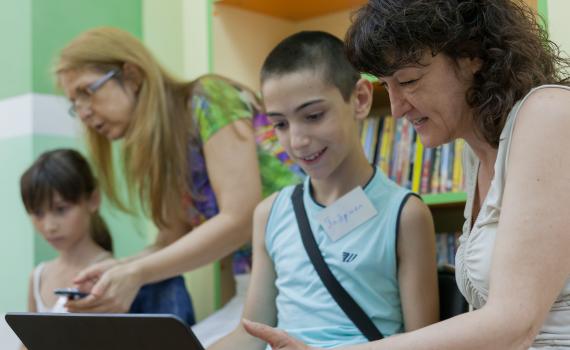
COMMUNITY NEED
In 2010, research by the World Bank found that Bulgarians had limited financial understandings, and recommended introduction of financial literacy programmes.
‘Lyuben Karavelov’ Regional Library rose to the challenge. In 2013, the library introduced a new service, offering financial literacy training for adults. Surveyed after training, 70% of learners said that their families would benefit if their children also had better financial literacy understandings and skills.
This feedback prompted librarians to design a financial literacy programme for young people. Because financial services are increasingly offered online, and more and more young people are using tablet computers and smart phones, the librarians decided to integrate mobile digital technology into the training.
THE INNOVATIVE SERVICE
In 2014, with a small grant (up to US$20,000) from the EIFL Public Library Innovation Programme (EIFL-PLIP), ‘Lyuben Karavelov’ Regional Library designed a fun, interactive financial literacy programme for children and youth.
They bought tablet, laptop and desktop computers, smart phones, and an interactive whiteboard, and installed this new digital technology in their training room.
Working with experts from their partners, including UniCredit Bulbank, Bulgaria’s largest bank, the librarians developed a two-tier financial literacy curriculum: for children aged up to 14, topics included a history of money; family budgets; saving and spending, and how to use mobile devices; learners aged from 15 to 24 learnt about budgeting; financial services, including credit and investment; consumer protection, and how to access financial services through mobile devices.
The training methodology was fun, combining presentations and practical computer training with games, role-plays, and competitions, and visits to the bank to get hands on experience with automatic tellers and to meet cashiers and bank staff.
ACHIEVEMENTS AND IMPACT
In less than a year (2014/15), the library –
- Trained 52 librarians and community volunteers to facilitate financial literacy classes for young people;
- Taught 233 children and youth financial literacy skills and how to use mobile technology to manage money and access financial services;
- Created online learning materials and uploaded them to the library’s website. The materials were viewed over 600 times in seven months;
- Organized an essay contest on the theme of money, which attracted 49 submissions. The winner received a smart phone.
- Presented the service at an international conference on financial literacy organized by the World Bank, after which World Bank officials visited the library and praised the service.
- Showcased the service to hundreds of librarians at 11 library conferences and events in Bulgaria, and invited 34 librarians from two libraries to visit Ruse and see the service in action.
The service increased the number of young people using the library by 27%. It also attracted new partnerships for the library in the education and business sectors.
Guided by participants’ feedback, librarians have introduced new topics and games, and refined their presentations.
They have also been busy training librarians from other libraries in Bulgaria who want to replicate the service.
EIFL-PLIP PROJECT TIMELINE
May 2014 – June 2015
ABOUT ‘LYUBEN KARAVELOV’ REGIONAL LIBRARY
‘Lyuben Karavelov’ Regional Library is based in Ruse, Bulgaria’s fifth largest city, in the northeastern part of the country. The library serves an average of 350 people per day, advancing community development by offering computer and internet access and training, print and e-resources, and organizing cultural events. In 2011, the library was awarded a grant from EIFL-PLIP and successfully implemented KNOW (Knowledge for New Opportunities for Work), an employment information, motivation and computer skills programme for unemployed people aged over 40.
ADDITIONAL RESOURCES
Read a two-page case study about the project.
MORE LIBRARIES CONTRIBUTING TO EDUCATION OF CHILDREN AND ADULTS
Read about more innovative public library services that contribute to education in the community. PLIP-EDUCATION





